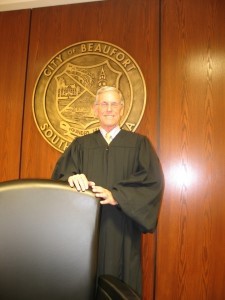By Lanier Laney
Approaching his 25th year on the bench as one of the most popular and colorful judges in Beaufort’s history, Judge Ned Tupper has even been recognized by The New York Times as being “known for dispensing justice in cases of minor offenses with a puckish, lighthearted humor.”
This quintessential “Southern lawyer” was actually born and raised up north in Montclair, N.J., and in affluent Southhampton, Long Island. Ralf Edwin (“Ned”) Tupper came south in 1966 at age 18 to attend Newberry College and later got his law degree from the University of South Carolina in Columbia.

After law school, he went back to New York with a goal to pass the bar and practice in New York.
Says Tupper, “I took the bar at the old Commodore Hotel grand ballroom full of people, none of whom I knew. The proctor stood in front of the room, and said ‘pretty much about a third of you are gonna flunk the bar’, said ‘if you need to use the rest room a proctor will follow you in to make sure you don’t cheat’. The second day I had breakfast next door at Grand Central Train Station and it cost $9 (my budget was $20 per day for food).”
The following Monday, when he took the South Carolina bar in the Supreme Court building, it was quite a different story. This time he knew everyone in the room and breakfast at Cogburns was only $1.35. The proctor looked like his favorite aunt. She told them that there were cokes in the back for everyone, urged everyone to relax and do their best and, as the churchbells in the church next door tolled 9 a.m., she said to them, “I just want you to know, I am praying that all of you pass.” Tupper said, “It was at that point that I said to myself, even if I pass the N.Y. bar, I am heading back to South Carolina the day after I get sworn in.”
He was sworn in in May 1975 and soon after accepted a job as Dean of Admissions at USC Law School (he had already been working in the admissions office for two years during law school there). About a year or so into that job, he took a position as an Attorney Advisor, “a fancy term for ‘law clerk’ ,” said Tupper, to a U.S. Tax Court Judge for two years and then was offered a job at his best friend from law school father’s firm, the Dowling law firm in 1978, and he has been practicing here in Beaufort ever since.
In 1983, Tupper joined two friends, Parker Barnes and Buster Davis, in a law firm. Over the years, and the changes they brought, it’s now called Tupper, Grimsley and Dean and is where he still practices general law.
How He Became a Judge
Said Tupper, “I really never thought about being a judge. Really, I just wanted to play centerfield for the New York Yankees, but when that did not pan out, I was approached initially by then Beaufort City Councilman David Taub and Mayor Henry Chambers who asked if I had any interest in being the city judge. I was, and still am, honored to serve. I was appointed in 1987.”
As Beaufort’s caseload has grown with the city, he now shares this duty with Judge Mary Sharp.
A few years ago, Judge Tupper was also appointed as a County Magistrate by Governor Sanford on the recommendation of state Sen. Tom Davis.
Qualities on Being a Judge
“I would like to think a fair judge is one who listens to both sides of a story. I am always cognizant that a person’s only experience with the court system may be in the city or magistrate court, therefore I do my best to make certain that everyone treat each other with respect, that I give both the state and the defendant an opportunity to fully explain their side of the case and then I rule. I know full well that each time I rule one side is not happy with my ruling, but I hope that they are at least satisfied that they were treated fairly and with respect.”
Then he added with a smile, “I sometimes have to tell the people who are unhappy with my rulings to please wait until they are outside the court building to cuss me. That warning usually, but not always, works. When it doesn’t and they disrespect the system, they generally become a guest of the detention center for 30 days”.
Types of Cases His
Court Rules On
Generally he sees and rules on misdemeanors with a maximum sentence of 30 days. His cases range from parking tickets to DUIs, criminal domestic violence, prostitution, cruelty to children and cruelty to animals (which, by the way, has a heavier fine on the books than cruelty to children).
Hearing cases is only part of his job. He is responsible for setting bond 365 days a year on people who are in jail. That involves being at the jail first thing in the morning, about 8 a.m. and reviewing each file and determining whether the inmate should post a cash bond or be released on their own recognizance, meaning not having to post a cash bond. Those who are either a danger to the community or a flight risk must post a cash bond.
Judge Tupper said, “Judges catch a lot of heat for releasing people on their own recognizance, especially from the anonymous bloggers who, in general, obviously know much more than the judges about the law and the cases.” His response has always been: “if you don’t like the fact that the Constitution requires us to release folks charged (not convicted), don’t blame me, blame Thomas Jefferson and John Adams and the other folks who wrote the Constitution.”
He also signs search warrants and is pretty much on call 24/7.
What advice does he have for anyone that has to go to court and come up in front of a judge?
“Don’t be nervous or scared, and look and act respectful. I remember when I got my first speeding ticket when I was about 17, my mother told me to make certain I wore a tie to court. I did, the judge lectured and fined me. However, today I smile to myself every time a young person comes in with a tie. In general, they seem to do very well in my court,” he said.
Legendary ‘Judge Tupper’ Stories
If you talk to almost anyone who has been around Beaufort these past 25 or more years, they will invariably have their own favorite “Judge Tupper” story, as visiting his courtroom (as a guest, not a defendant) can be as entertaining as a T.V. show.
One favorite is this story: Many years ago, about four days before Christmas, a young African-American lady was brought in on shoplifting charges. Judge Tupper noted that she had no prior record and asked her why she had shoplifted. She said she had lost her job because the company had moved out of town and she and her children barely had enough money to eat and she had felt so bad the children would have no Christmas, that she had tried to shoplift some toys for them and was very sorry.
Tupper had to find her guilty and sentenced her to jail. Four days later, on Christmas Eve, he commuted her sentence and let her out and took her to the store where she had shoplifted. He then proceeded to buy all the toys she had tried to steal plus more, then went and bought a tree and all the decorations. When the children awoke the next morning, not only was their mother home, the house was decorated and filled with toys. He told the woman that he never wanted to see her in his courtroom again.
Five years later, Tupper was shopping at the Tanger Mall, when a very well-dressed professional woman tapped him on the shoulder. She said, “Judge Tupper, you probably don’t remember me, but you bought my children Christmas five years ago. I’ve never been back in your courtroom again and now I’m the manager of this store,” she said with a smile.
During the past 24 years on the bench, Judge Tupper has presided over an estimated 240,000 cases, and continues to be a fair and friendly judge to the city of Beaufort.





